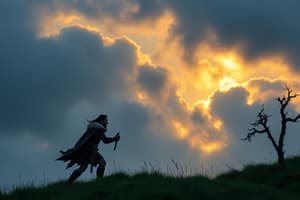Podcast
Questions and Answers
Which piece of literature involves a legendary hero confronting a monster?
Which piece of literature involves a legendary hero confronting a monster?
- Sonnet 130
- Grendel (correct)
- Tomorrow tomorrow tomorrow
- Full fathom five
What theme is predominantly expressed in the phrase 'fear no more the heat the sun'?
What theme is predominantly expressed in the phrase 'fear no more the heat the sun'?
- Hope for the future
- Ambivalence towards life
- Reassurance in death (correct)
- Fear of love
In which literary work does the line 'saint crispin's day' appear, signifying camaraderie among soldiers?
In which literary work does the line 'saint crispin's day' appear, signifying camaraderie among soldiers?
- Hamlet
- Paradise Lost
- Henry V (correct)
- Canterbury Tales
Which of the following is NOT a sonnet by Shakespeare?
Which of the following is NOT a sonnet by Shakespeare?
What is the main subject of 'the prologue from Canterbury Tales'?
What is the main subject of 'the prologue from Canterbury Tales'?
Flashcards
Shakespeare's Sonnets
Shakespeare's Sonnets
A collection of 154 sonnets by William Shakespeare.
Paradise Lost
Paradise Lost
A long epic poem by John Milton.
The Canterbury Tales
The Canterbury Tales
A collection of stories told by a group of pilgrims.
Beowulf
Beowulf
Signup and view all the flashcards
Shakespeare's 'To be or not to be'
Shakespeare's 'To be or not to be'
Signup and view all the flashcards
Study Notes
Literary Works and Themes
- Several literary works are listed, including poems, plays, and epic poems.
- Works include dramatic excerpts, sonnets, and a narrative poem.
- Themes of love, death, struggle, and the passage of time are prevalent across the anthology.
- The anthology includes works spanning different time periods from medieval works to the Renaissance era and beyond.
Specific Literary Works
- Beowulf: An Old English epic poem narrating the hero's battles against mythical creatures.
- Grendel: A part or character within the epic poem Beowulf, possibly a separate work centered on Grendel.
- Federicko's Falcon: A work potentially referencing a falcon or some type of hunting. Further context is needed.
- Fall of Satan from Paradise Lost: A crucial point in John Milton's epic poem, detailing Lucifer's downfall.
- Sonnets 116 and 130 (Shakespeare): Two renowned sonnets by William Shakespeare, focusing respectively on the concept of true love and a less conventional portrayal of love.
- Prologue from Canterbury Tales: A section from Geoffrey Chaucer's famous collection of stories, potentially highlighting the characters and settings.
- Life in 999: A work possibly dealing with a view of daily life in the year 999.
- Blow, Blow, Blow thy Winter Wind: A poem potentially about the melancholy or the harshness of winter.
- Full Fathom Five: A line from a poem, maybe a Shakespearean tragedy, referencing a depth of five fathoms under the sea.
- Fear no more the heat the sun: An excerpt or title of a work possibly focusing on the absence of fear.
- Beowulf Part 2: If this exists, it suggests continuation of the Beowulf story. Further information needed.
- Tomorrow, Tomorrow, Tomorrow: A poem or song about repetition or an endless cycle.
- To be or not to be: A famous line from a play/speech, potentially from a tragedy by Shakespeare, contemplating existential themes.
- Saint Crispin's Day: A work likely referencing this specific day or the event. Further information needed.
- Our Revels now are ended: Also an excerpt from a play/speech, probably referencing the conclusion or ending of a celebration or activity.
Grammar Study
- Grammar study is mentioned as a separate segment within this material.
Studying That Suits You
Use AI to generate personalized quizzes and flashcards to suit your learning preferences.




